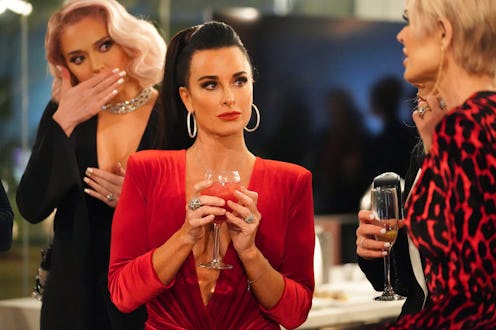TV & Movies
What Lockdown Taught Me About Owning My TV Guilty Pleasures
"I let go of any shame which I had previously associated with the genre, fully realising the value of light entertainment."

While being able to remain at home and having a home to remain in during the coronavirus outbreak is a privilege, it's hard to deny that lockdown has been a challenge. It tore us away from the comforts of everyday life — the joy of sharing a pint with friends or celebrating a birthday with family. Yet for many of us, the experience has also given us the chance to pause and reflect, to take stock of what matters most. In What I Learnt In Lockdown, writers share what this period has meant for them and what lessons they'll take away as we all begin to emerge from our COVID-19 cocoons.
It's the year 2002. During some late-night channel surfing I stumble upon the third series of Channel 4's Big Brother. In that moment, my obsession with reality television began.
While my fondness for the much-derided genre has been clear since that day 18 years ago, I've always held it firmly at arms length, telling myself that reality TV was shameful. I mean, it's hardly a beacon of intellectual stimulation is it? Then 2020 happened, and all the rules changed. As we rapidly descended into lockdown, powering through countless hours of reality television became an acceptable – nay advisable – way to spend our free time.
Like many, I began lockdown with noble intentions, promising myself I'd use the time to learn new skills and read as many books in my untouched stack as possible. But, three days in, and I found much more solace in The Real Housewives of Beverly Hills than any attempt at 'self-improvement' (at least, in the traditional sense).
By week three, I'd fully embraced the depths of a reality TV rabbit hole, comfort-streaming the likes of Vanderpump Rules and Jersey Shore. I've worked out that, in total, I dedicated around 320 hours to the genre during the early weeks of lockdown. That's almost 14 full days.
But, in the circumstances of self-isolation and rising daily death tolls, a strong dose of reality TV provided the sense of relief I had long been craving.
To some people — including pre-pandemic me — that may appear a huge waste of time. But, in the circumstances of self-isolation and rising daily death tolls, a strong dose of reality TV provided the sense of relief I had long been craving.
As psychologist and psychotherapist Dr Jonathan Pointer explained to Stylist, switching off your brain can be hugely beneficial for your mental health, however you choose to do it. “It allows us to disconnect from the stresses and strains of our lives," Pointer said. "When people become focused on something that takes them to another place in their mind (through TV, films, books etc.), their experience of pain will often decrease."
For me, this theory could certainly be applied to reality TV. And as the episodes rolled on, I let go of any shame which I had previously associated with the genre, fully realising the value of light entertainment. It soon became clear I was in good company. Whitney Port of The Hills and The City fame, for instance, had spent quarantine indulging in a similar ritual, filming her reaction to the MTV classics that birthed her career.
More recently, journalist Elizabeth Day has spoken of finding similar joy in another lockdown hit, Netflix's Selling Sunset. "If a person dismisses reality television as 'lightweight', it probably means they themselves are lightweight and terrified of their fragile intellect being damaged by watching anything that isn’t an earnest documentary on steam trains," she says, unapologetically.
"I think that the Housewives have replaced soap operas, because truth is stranger than fiction."
Further examining my fondness for the genre – I had enough time! – I started to better understand why it's so successful. As well as the mental health benefits of this joyful light relief, there's an endearing element of nostalgia, with many parallels to the good old-fashioned soap operas we grew up on. The man behind The Real Housewives franchise, Andy Cohen, agrees. "The goals of reality TV and soap operas are pretty similar: It’s to educate sometimes, entertain always," Cohen explained. "I think that the Housewives have replaced soap operas, because truth is stranger than fiction."
So, I'm now proud to write in print, that I'm a reality TV fan. It just took a global pandemic for me to realise it.